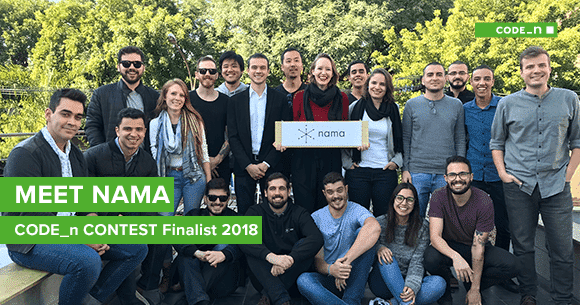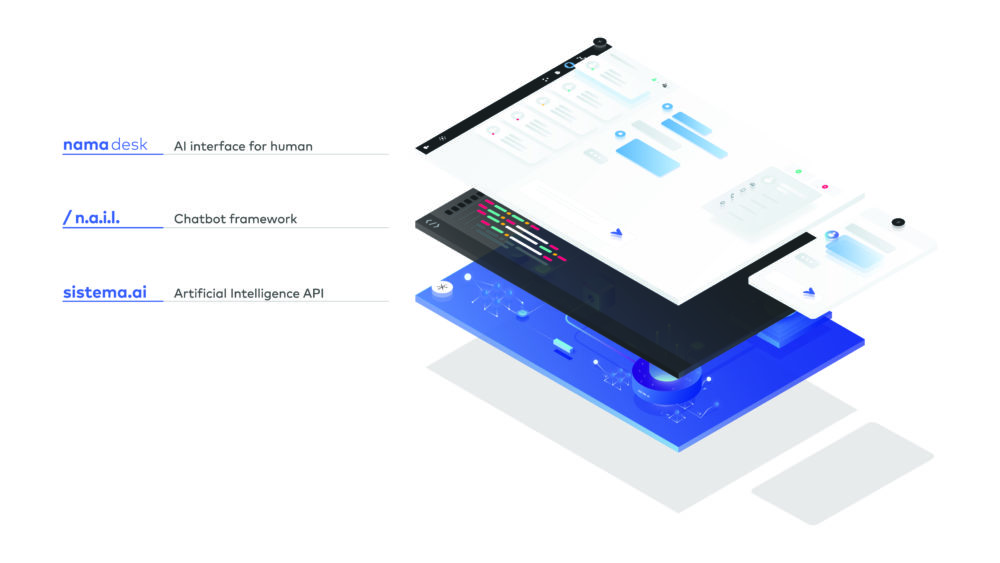MEET OUR CODE_N CONTEST FINALISTS 2018: Nama from Brazil
 Their mission is to provide a natural connection between people and AI by transforming complex interactions into simple conversations through an efficient and personalized service. Our CODE_n CONTEST Finalist, Nama, a Brazilian company, is leading the way in Intelligent Virtual Assistants for improved and efficient customer service. Nama’s chatbot is designed to deliver truly affective and automatic customer experience by employing natural language dialogues using a text-based chat interface that can be integrated with other messaging channels, such as Facebook Messenger. Learn more about this Sao Paulo-based startup in our interview with CEO & Founder, Rodrigo Scotti.
Their mission is to provide a natural connection between people and AI by transforming complex interactions into simple conversations through an efficient and personalized service. Our CODE_n CONTEST Finalist, Nama, a Brazilian company, is leading the way in Intelligent Virtual Assistants for improved and efficient customer service. Nama’s chatbot is designed to deliver truly affective and automatic customer experience by employing natural language dialogues using a text-based chat interface that can be integrated with other messaging channels, such as Facebook Messenger. Learn more about this Sao Paulo-based startup in our interview with CEO & Founder, Rodrigo Scotti.
Aishah: What is Nama all about?
Rodrigo: Nama is an artificial intelligence company specialized in business-based natural language applications. Nama has been the leading provider of automated chat in Brazil for a year, with high-impact business cases in different verticals, and has had more than 7.7 million unique users of its solution during the past 18 months alone. What drives us is a belief in building a “simple tomorrow” by solving complex interactions. The Nama platform enables collaboration environments between call center operatives, managers, and bots. It automates over 90% of conversations, at the same time it empowers teams by providing insightful information on their customers and answering questions. Until now, customer service teams have been living in a world of disorganized data, based on chat transcripts, social transcripts, and more. Including humans in the loop with AI helps to make more sense of data and ultimately helps companies understand what their customers are saying, requesting, complaining about, praising, and questioning. This allows businesses to really understand their clients and build a simple tomorrow.
Aishah: How did you come up with the idea?
Rodrigo: Nama started developing its technology in February 2014 with Rodrigo Scotti and Leonardo Baptista. This was not our first startup, however. We began our first venture in early 2011: a voice-based assistant for corporations. This resulted in a successful business case following the launch of its solution with a major Brazilian publisher. Unfortunately, it was not possible to keep the project running. Despite this, we did not give up on virtual assistants. Instead, we shifted the development toward text-based virtual assistants and set up a new company: Nama. The company owes its origins to the rising demand of big companies for better and scaled-up customer support. Customer care needs to be better – and it can be. It was also clear that there is an important rise in adoption, especially when it comes to chat support, which is emerging as the preferred communication channel for customers all over the world.
Aishah: What are you trying to solve?
Rodrigo: We live in an era of business interaction driven by micro-moments. What we’re witnessing is a whole series of transactions fueled by conversation and new brand experiences. The customer care experience is shifting toward chat-based interaction. For over 41% of users, chats are now the preferred communication channel. This growth in chat is fueling demand for high volumes of instant communication. To meet this rise in demand, companies have two options: (i) Hire more people, which is expensive and time-consuming (ii) Introduce administrative procedures to improve the productivity of call center operatives at the expense of the customer experience. Nama’s solution seeks to overcome this trade-off by combining human and artificial intelligence to help companies deliver high volumes of productive conversation.
The Nama platform takes care of the entire process of delivering a better brand experience, from creating chatbots to empowering chat operatives, answering questions, and providing information on the customer.
Aishah: Automation is everywhere these days, and as we can see with Nama, the customer service industry is no exception. Why is AI in customer experience management now such a game-changer for so many businesses?
Rodrigo: Modern customers want productive, fast, and seamless experiences with brands. With the growth of chat platforms, companies have no choice but to establish a presence in this medium. This medium, however, requires quick or immediate answers. That’s the whole point of chat. Solving this problem by only offering chat with humans is very costly and an issue when it comes to uniformity. Artificial intelligence with natural language processing can provide you with the right solutions to automate large parts of the process. Training AI to understand the most common situations in customer interactions helps reduce the burden on chat operatives, leaving them with enough time to focus on customer care and providing advice. This makes it possible to support customers who are trying to solve very simple issues by offering 24/7 solutions so that they can solve their own problems right away. If customers have more complex issues, a chat operative can be on hand to solve their problem. Before AI, operatives would probably have been tied up by minor issues, leaving the customer waiting in line. Bringing together machine intelligence and human intelligence is the key to addressing the demands of chat media and opens the door to fast and productive customer care. It can automate the most common conversations and thus allows chat operatives to deal with the more complex issues.
Aishah: Thanks for the interview Rodrigo!
Meet Nama at the new.New Festival 2018 this fall, in Stuttgart!






Write a comment